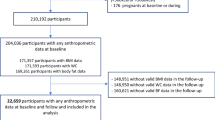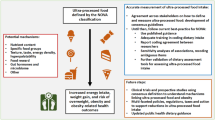Abstract
Sugar-sweetened beverages (SSBs) contain high amounts of nutrient-deficient calories in the form of rapidly digestible carbohydrates. Substantial evidence links SSB consumption to an increased risk for obesity and weight gain, which is hypothesized to result from incomplete compensatory reductions in energy intake at subsequent meals after beverage consumption. Higher levels of SSB consumption have also been associated with unfavorable levels of several other traditional cardiovascular risk factors, such as impaired glucose metabolism, hypertension, dyslipidemia, as well as a higher incidence of coronary heart disease. Although the excess obesity that results from SSB consumption likely contributes elevated risk for the development of a variety of adverse health conditions, epidemiologic evidence is emerging indicating that the relationship between SSB consumption and the incidence of cardiovascular disease events and several traditional cardiovascular risk factors is not fully explained by conventional mediators, including obesity. This review summarizes the current epidemiologic evidence from population-based and epidemiologic cohort studies that both supports and refutes the adverse impact of SSB consumption on cardiovascular health that may occur independently of obesity and weight gain.
Similar content being viewed by others
References
Olsen NJ, Heitmann BL. Intake of calorically sweetened beverages and obesity. Obesity Rev. 2009;10:68–75.
Malik VS, Schulze MB, Hu FB. Intake of sugar-sweetened beverages and weight gain: a systematic review. Am J Clin Nutr. 2006;84:274–88.
Malik VS, Popkin BM, Bray GA, Despres JP, Hu FB. Sugar-sweetened beverages, obesity, type 2 diabetes mellitus, and cardiovascular disease risk. Circulation. 2010;121:1356–64.
Schulze MB, Manson JE, Ludwig DS, Colditz GA, Stampfer MJ, Willett WC, et al. Sugar-sweetened beverages, weight gain, and incidence of type 2 diabetes in young and middle-aged women. JAMA. 2004;292:927–34.
Dhingra R, Sullivan L, Jacques PF, Wang TJ, Fox CS, Meigs JB, et al. Soft drink consumption and risk of developing cardiometabolic risk factors and the metabolic syndrome in middle-aged adults in the community. Circulation. 2007;116:480–8.
Aeberli I, Gerber PA, Hochuli M, Kohler S, Haile SR, Gouni-Berthold I, et al. Low to moderate sugar-sweetened beverage consumption impairs glucose and lipid metabolism and promotes inflammation in healthy young men: a randomized controlled trial. Am J Clin Nutr. 2011.
Mattes RD. Dietary compensation by humans for supplemental energy provided as ethanol or carbohydrate in fluids. Physiol Behav. 1996;59:179–87.
DiMeglio DP, Mattes RD. Liquid vs solid carbohydrate: effects on food intake and body weight. Int J Obes Relat Metab Disord. 2000;24:794–800.
Wooley OW, Wooley SC, Dunham RB. Can calories be perceived and do they affect hunger in obese and nonobese humans? J Comp Physiol Psychol. 1972;80:250–8.
Mensah GA, Brown DW. An overview of cardiovascular disease burden in the United States. Health Aff. 2007;26:38–48.
Lasater G, Piernas C, Popkin BM. Beverage patterns and trends among school-aged children in the US, 1989–2008. Nutr J. 2011;10:103.
Popkin BM. Patterns of beverage use across the lifecycle. Physiol Behav. 2010;100:4–9.
Bleich SN, Wang YC, Wang Y, Gortmaker SL. Increasing consumption of sugar-sweetened beverages among US adults: 1988–1994 to 1999–2004. Am J Clin Nutr. 2009;89:372–81.
Bray GA. The epidemic of obesity and changes in food intake: the Fluoride Hypothesis. Physiol Behav. 2004;82:115–21.
Bray GA, Nielsen SJ, Popkin BM. Consumption of high-fructose corn syrup in beverages may play a role in the epidemic of obesity. Am J Clin Nutr. 2004;79:537–43.
Chen L, Caballero B, Mitchell DC, Loria C, Lin PH, Champagne CM, et al. Reducing consumption of sugar-sweetened beverages is associated with reduced blood pressure: a prospective study among United States adults. Circulation. 2010;121:2398–406.
de Koning L, Malik VS, Kellogg MD, Rimm EB, Willett WC, Hu FB. Sweetened beverage consumption, incident coronary heart disease, and biomarkers of risk in men. Circulation. 2012;125:1735–41. S1731.
Cohen L, Curhan G, Forman J. Association of sweetened beverage intake with incident hypertension. J Gen Intern Med. 2012;27:1127–34.
Mattei J, Malik V, Hu FB, Campos H. Substituting homemade fruit juice for sugar-sweetened beverages is associated with lower odds of metabolic syndrome among Hispanic adults. J Nutr. 2012;142:1081–7.
Montonen J, Jarvinen R, Knekt P, Heliovaara M, Reunanen A. Consumption of sweetened beverages and intakes of fructose and glucose predict type 2 diabetes occurrence. J Nutr. 2007;137:1447–54.
Palmer JR, Boggs DA, Krishnan S, Hu FB, Singer M, Rosenberg L. Sugar-sweetened beverages and incidence of type 2 diabetes mellitus in African American women. Arch Int Med. 2008;168:1487–92.
Paynter NP, Yeh HC, Voutilainen S, Schmidt MI, Heiss G, Folsom AR, et al. Coffee and sweetened beverage consumption and the risk of type 2 diabetes mellitus: the atherosclerosis risk in communities study. Am J Epidemiol. 2006;164:1075–84.
Lloyd-Jones DM, Leip EP, Larson MG, D’Agostino RB, Beiser A, Wilson PW, et al. Prediction of lifetime risk for cardiovascular disease by risk factor burden at 50 years of age. Circulation. 2006;113:791–8.
Bernstein AM, de Koning L, Flint AJ, Rexrode KM, Willett WC. Soda consumption and the risk of stroke in men and women. Am J Clin Nutr. 2012;95:1190–9.
Day N, McKeown N, Wong M, Welch A, Bingham S. Epidemiological assessment of diet: a comparison of a 7-day diary with a food frequency questionnaire using urinary markers of nitrogen, potassium, and sodium. Int J Epidemiol. 2001;30:309–17.
Willett W. Commentary: dietary diaries vs food frequency questionnaires-a case of undigestible data. Int J Epidemiol. 2001;30:317–9.
Johnson RK, Appel LJ, Brands M, Howard BV, Lefevre M, Lustig RH, et al. Dietary sugars intake and cardiovascular health: a scientific statement from the American Heart Association. Circulation. 2009;120:1011–20.
Vuilleumier S. Worldwide production of high-fructose syrup and crystalline fructose. Am J Clin Nutr. 1993;58(5 Suppl):733S–6S.
Havel PJ. Dietary fructose: implications for dysregulation of energy homeostasis and lipid/carbohydrate metabolism. Nutr Rev. 2005;63:133–57.
Hallfrisch J. Metabolic effects of dietary fructose. FASEB J. 1990;4:2652–60.
Friedman JM. Leptin at 14 y of age: an ongoing story. Am J Clin Nutr. 2009;89:973S–9S.
Flier JS, Maratos-Flier E. Lasker lauds leptin. Cell. 2010;143:9–12.
Pliquett RU, Fuhrer D, Falk S, Zysset S, von Cramon DY, Stumvoll M. The effects of insulin on the central nervous system—focus on appetite regulation. Hormone and Metabolic Research = Hormon - und Stoffwechselforschung = Hormones et metabolisme. 2006;38:442–6.
Porte Jr D, Seeley RJ, Woods SC, Baskin DG, Figlewicz DP, Schwartz MW. Obesity, diabetes and the central nervous system. Diabetologia. 1998;41:863–81.
Havel PJ. Control of energy homeostasis and insulin action by adipocyte hormones: leptin, acylation stimulating protein, and adiponectin. Curr Opin Lipidol. 2002;13:51–9.
de Carvalho Sales-Peres SH, Magalhaes AC, de Andrade Moreira Machado MA, Buzalaf MA. Evaluation of the erosive potential of soft drinks. Eur J Dentist. 2007;1:10–3.
Johnson RJ, Sanchez-Lozada LG, Nakagawa T. The effect of fructose on renal biology and disease. JASN. 2010;21:2036–9.
Tran LT, Yuen VG, McNeill JH. The fructose-fed rat: a review on the mechanisms of fructose-induced insulin resistance and hypertension. Mol Cell Biochem. 2009;332:145–59.
Wang DD, Sievenpiper JL, de Souza RJ, Chiavaroli L, Ha V, Cozma AI, et al. The effects of fructose intake on serum uric acid vary among controlled dietary trials. J Nutr. 2012;142:916–23.
Hellerstein MK. Carbohydrate-induced hypertriglyceridemia: modifying factors and implications for cardiovascular risk. Curr Opin Lipidol. 2002;13:33–40.
Chong MF, Fielding BA, Frayn KN. Mechanisms for the acute effect of fructose on postprandial lipemia. Am J Clin Nutr. 2007;85:1511–20.
Fried SK, Rao SP. Sugars, hypertriglyceridemia, and cardiovascular disease. Am J Clin Nutr. 2003;78:873S–80S.
Bantle JP, Raatz SK, Thomas W, Georgopoulos A. Effects of dietary fructose on plasma lipids in healthy subjects. Am J Clin Nutr. 2000;72:1128–34.
Oettle GJ, Emmett PM, Heaton KW. Glucose and insulin responses to manufactured and whole-food snacks. Am J Clin Nutr. 1987;45:86–91.
Hu FB, Malik VS. Sugar-sweetened beverages and risk of obesity and type 2 diabetes: epidemiologic evidence. Physiol Behav. 2010;100:47–54.
Ludwig DS. The glycemic index: physiological mechanisms relating to obesity, diabetes, and cardiovascular disease. JAMA. 2002;287:2414–23.
Conflict of Interest
Christina M. Shay declares that hat she has no conflict of interest.
Michelle E. Dennison-Farris declares that she has no conflict of interest.
Author information
Authors and Affiliations
Corresponding author
Rights and permissions
About this article
Cite this article
Shay, C.M., Dennison-Farris, M.E. Does Sugar-Sweetened Beverage Consumption Influence Cardiovascular Risk Independent of Weight Gain and Obesity? an Update of the Epidemiologic Evidence. Curr Cardiovasc Risk Rep 7, 166–172 (2013). https://doi.org/10.1007/s12170-013-0311-3
Published:
Issue Date:
DOI: https://doi.org/10.1007/s12170-013-0311-3




